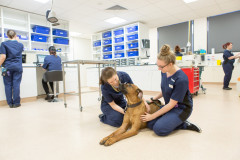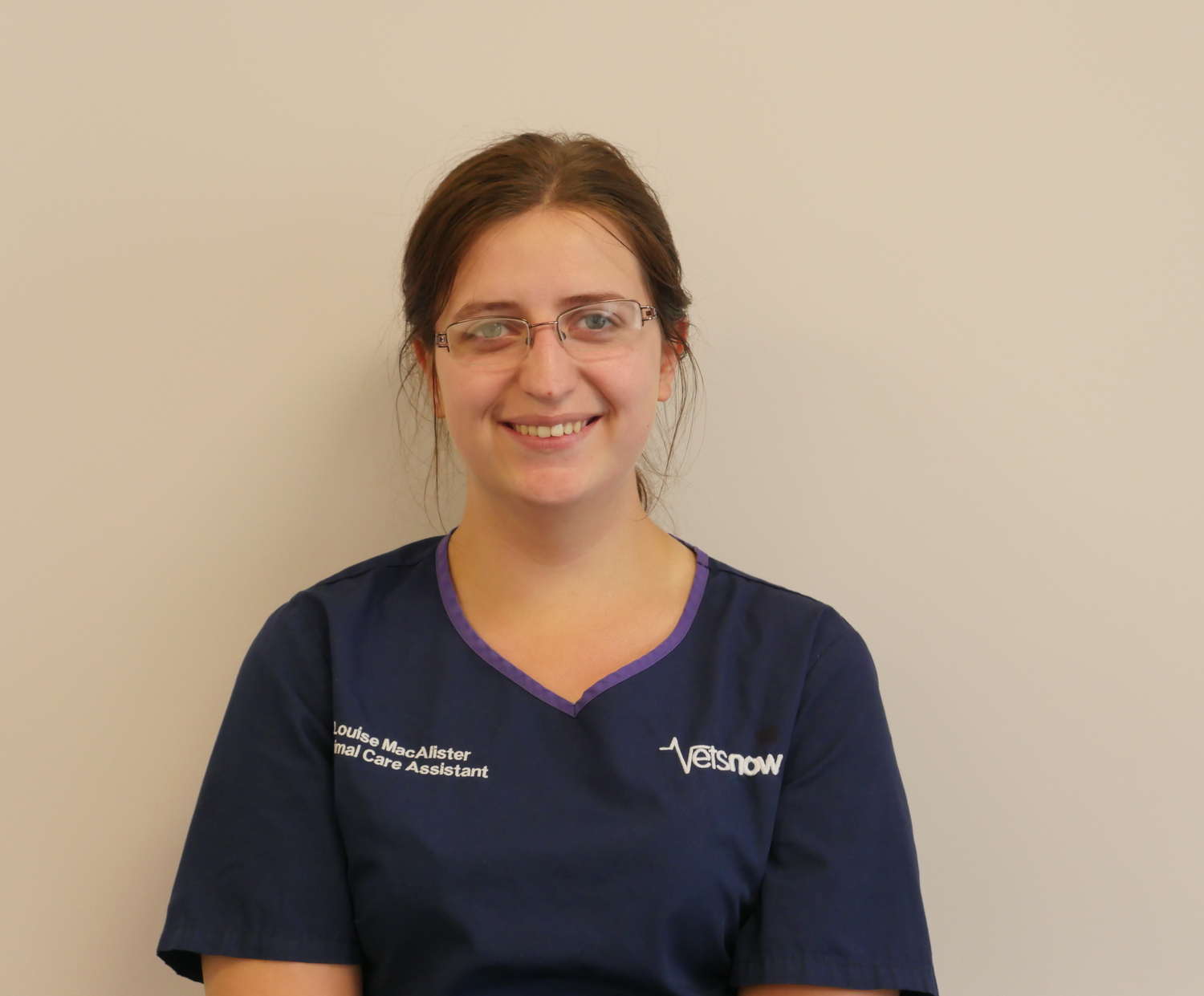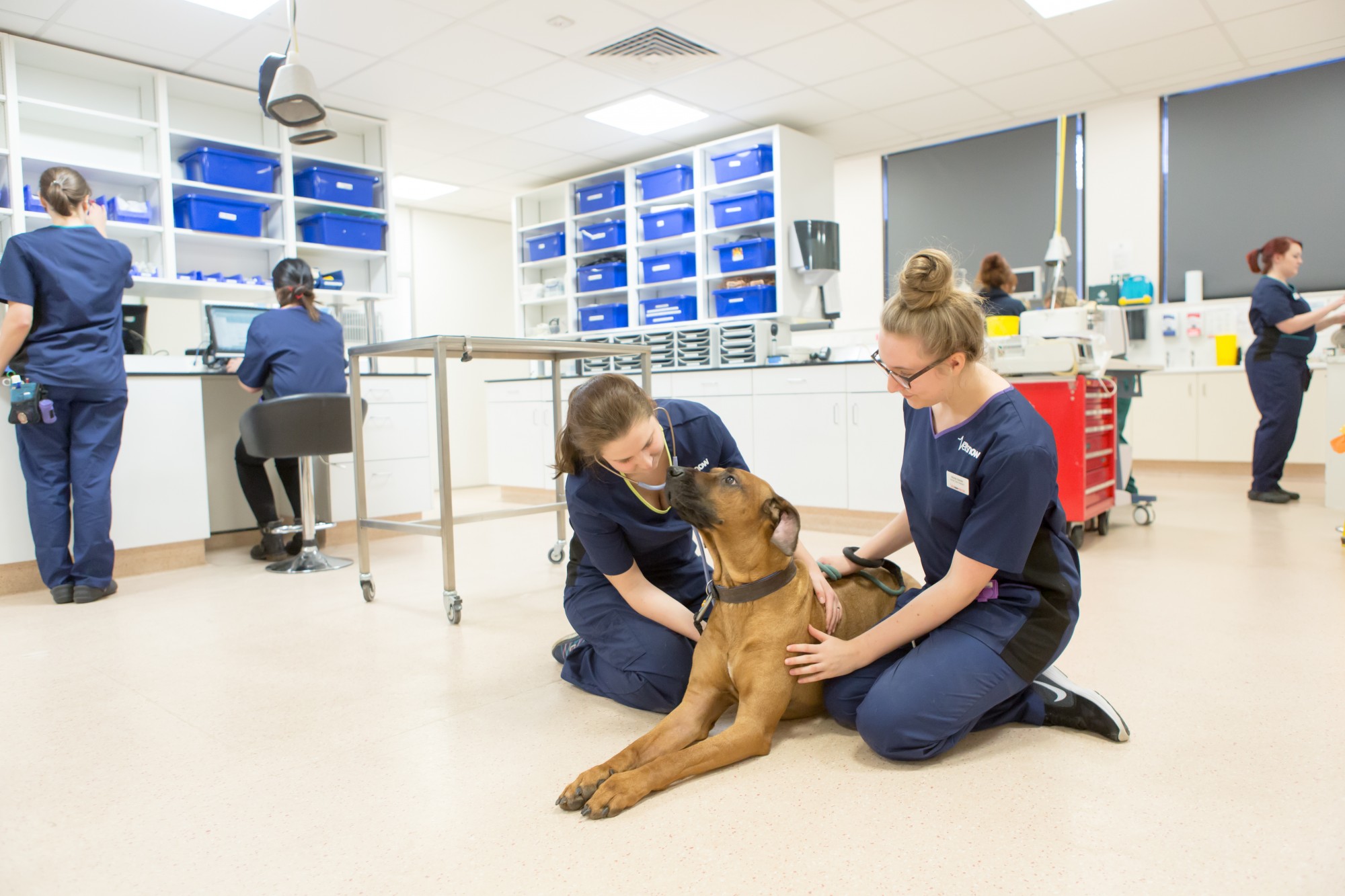A part-time receptionist job at Vets Now set Louise’s career on a different path
With hundreds of people working across our nationwide network of clinics and hospitals, we know there is no single route into a career in the veterinary profession. That’s why, at Vets Now, we strive to offer a career path for everyone, with opportunities to learn and develop no matter what role they’re in.
Louise Macalister is the perfect example of this. She had no intention of joining the veterinary profession while studying animal biology at university, but a part-time job as a vet receptionist at our Glasgow hospital ignited her passion, leading her into an animal care assistant role.
After gaining invaluable experience as an ACA, Louise has now set her sights on completing an apprenticeship in veterinary nursing. In this interview, she explains how joining Vets Now has led her along a career path that she never expected to take.

Interested in a career at Vets Now?
Find out more about our current job opportunities here.
Our vacanciesHow did you end up at Vets Now?
I grew up in the countryside in Campbeltown and then moved to Edinburgh to study animal biology at Napier University. In the summer, between my third and fourth years, I got a job at Vets Now in Glasgow, working five days a month as a receptionist.
I hadn’t planned on working in the veterinary profession, I kind of fell into it. I was really interested in animal behaviour research and my long term plan was always to do animal biology, then get a masters in behaviour research, and then eventually go into conservation research. But I came here and fell in love with the place. I quickly realised this is actually where I wanted to be.
How has your career progressed since joining?
The head of reception offered me a full-time referral receptionist role, which I did for about a year. I then applied for a student nursing apprenticeship. I didn’t have any hands-on experience but they could see that I was serious about it and offered me an animal care assistant role. For about six months, I worked half the week as a referral receptionist and the other half as an ACA and I loved it. I then took on a role as a full-time surgical animal care assistant.
I’d been an ACA for about a year and a half when the nursing apprenticeship opportunity came back up again. I applied, went through the interview process and I was successful, so I’ll start my nursing in September.

What does the nursing apprenticeship involve?
I’ll spend the majority of my time at Vets Now and then every so often I’ll go to college to study nursing theory. I’ll also have a mentor here to support me and to help with my progress log. The course is about two and a half to three years long and it’s being funded by Vets Now.
Once you’ve become an RVN, what are your goals?
I really love out-of-hours emergency – the variety and the intensity of it – so my aim is to stay in this field. I’ve signed a learning agreement for a year after I graduate and so once I’m a registered veterinary nurse I can work anywhere in the Vets Now out-of-hours clinic network.
What does a typical day look like for an ACA in the hospital?
Out-of-hours ACAs come in and make sure everything is clean, tidy and stocked up, then the majority of the shift is spent assisting with any patients that come in during the night through our emergency service. This includes helping with procedures if necessary, walking and ensuring that all our patients have been fed, watered and out to the toilet, and any cleaning that’s needed. There are also times when critically-ill patients are constantly coming through the door and you need to just do whatever the vets and nurses need you to do at any given moment.
There are a few different types of non-OOH ACA roles in our hospitals, such as general, medicine and surgery. The responsibilities are similar across them all but, in my role, I help set up the theatres for the day’s procedures, prep the various stations and generally just make sure things are where they need to be for the day ahead. As the day goes on, you’re often involved in prepping patients, keeping everything clean and tidy and washing and sterilising surgical instruments. If there are two or three surgical procedures going on at once, you need really need to be on top of where everything is and what everyone is doing.
Would you recommend this role to others?
Yes, 100%. If you’re looking to become an ACA and you’ve got little or no experience I personally think that out of hours is the ideal place to start. We see such a wide variety of interesting cases and it builds your knowledge really quickly as you have to know a little bit of everything.

Is there anything you know now that you wished you’d known when you started?
You’re going to make mistakes, but it’s okay. And trust the people you work with and know that they’ve got your back. You can go to them with anything you need to and they’ll 100% support you through it.
Have there been any proud moments?
I think handling the role change from reception to out of hours and then to surgery. I used to be such an anxious person and quite quiet, and now I feel much more confident in my job.
If you could give one piece of advice to somebody considering following in your footsteps, what would it be?
Work really hard. Not every day is going to be amazing, but overall, it is really worthwhile and the experience you gain will set you up for life. So just keep your head down, work hard, and try your best.
